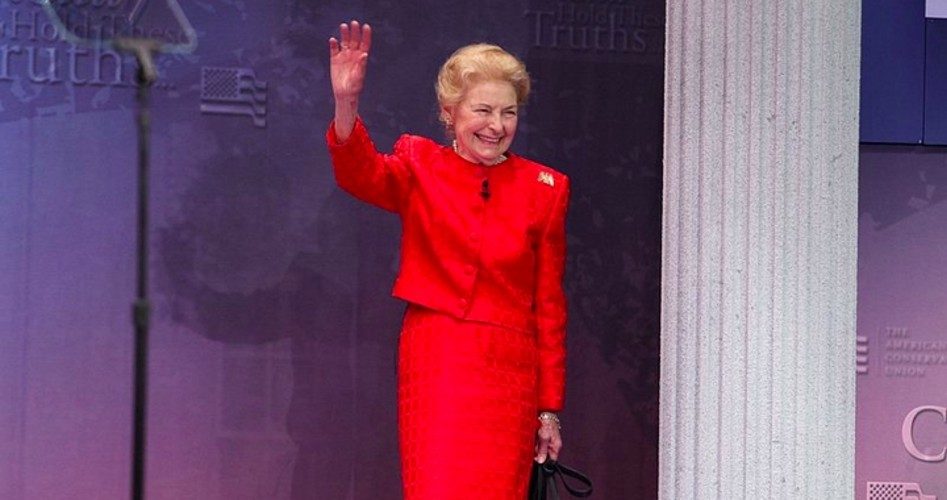
When people think of those who have had made the most impact on American history, it is common for them to think of presidents or members of Congress. But Phyllis Schlafly (shown) is a testimony to the positive influence that one man — or one woman — can have on the course of our history, without that person having served one day in either the White House, or even in the halls of Congress. As political scientist Alan Wolfe wrote in The New Republic in 2005, “Schlafly has to be regarded as one of the two or three most important Americans of the last half of the 20th century.”
Phyllis Schlafly died of cancer on Monday at the age of 92, an icon of those conservatives who were dedicated to our constitutional form of government.
In an interesting aside, insight into the political viewpoint pushed by the Associated Press (AP) was revealed in its commentary about Schlafly: Schlafly’s Eagle Forum organization was characterized as “ultraconservative,” summing up its mission as for “low taxes, a strong military and English-only education.” That’s “ultraconservative”?
Schlafly considered Eagle Forum, an organization she founded in 1975, as her greatest legacy. Eagle Forum evolved from STOP ERA, an organization she formed in 1972 to combat the passage of the so-called Equal Rights Amendment (ERA). Although Schlafly is probably most associated in the public mind with such “social issues” as feminism, same-sex “marriage,” and abortion, prior to her involvement in the fight against ERA, she was a pillar of the Old Right — those who were concerned about fidelity to the Constitution and a non-interventionist foreign policy.
In fact, she was rather ambivalent about the ERA when it was first being considered by Congress. Then, in late 1971, she was asked by a friend to oppose it, a friend who pleaded with her to educate herself on the issue. This friend’s intervention with Schlafly is yet another proof that one person can make a huge difference. ERA, which proposed to outlaw any discrimination on account of sex, had already passed the House of Representatives, and appeared certain to win ratification by enough state legislatures to be added to the Constitution.
After becoming convinced of the dangers of the ERA, Schlafly formed STOP ERA. Along with the constitutionalist John Birch Society, she tirelessly warned that the ERA was dangerous to our very form of government, noting that it would involve a massive transfer of laws and power from the states to the federal courts. She predicted it would be used by the federal judiciary to require the drafting of women into combat (of course, progressives of her day dismissed her concerns as a fear tactic, while progressives of the day embrace women in combat).
I can well remember the efforts of STOP ERA in my state of Oklahoma, in which ladies lobbied state legislators against the proposed constitutional amendment. Oklahoma was the first state to defeat its ratification. Despite garnering 35 of the 38 states needed to add ERA to the Constitution, the efforts of Schlafly and her anti-ERA allies killed it.
When the Supreme Court issued its infamous Roe v. Wade decision in 1973, Schlafly was a key figure in the creation of the pro-life movement. By 1976, due largely to her efforts, the Republican Party platform embraced the protection of the unborn, a plank that has continued to find a spot in every national party platform since.
Schlafly’s effectiveness at blocking the feminist agenda so angered Betty Friedan that she once told Schlafly, “I’d like to burn you at the stake,” dismissing her as an “Aunt Tom.” Schlafly enjoyed provoking such hostile reactions, once saying that “sex-education classes are like in-home sales parties for abortions.” Among her favorite opening lines of a speech was to say, “I want to thank my husband, Fred, for letting me come here,” knowing how much it irritated what she called “the women’s libbers.”
During her fight against ERA, Schlafly was not only verbally attacked, she also was the victim of physical assaults, from pig’s blood being thrown on her to having a pie smashed into her face.
Donald Critchlow, author of Phyllis Schlafly and Grassroots Conservatism: A Woman’s Crusade, said in 2005 that defeat of the ERA, largely through the efforts of Schlafly and her Eagle Forum, helped revive conservatism and paved the way for the election of Ronald Reagan in 1980. “Schlafly had discovered a genuine populist sentiment in a large female population that opposed the E.R.A., feminism and modern liberalism with the same intensity of emotion that feminists brought to their cause,” Critchlow wrote.
But Schlafly’s conservative principles were much more broad-based than social issues, as important as they are. In 1964, she self-published A Choice Not an Echo, a book that eventually sold three and a half million copies. The book was designed to promote the candidacy of Senator Barry Goldwater of Arizona, who was seeking the Republican nomination. Without the book, it is unlikely that Goldwater would have won the Republican Party nod.
The thesis of A Choice Not an Echo was quite clear. She documented how the group she called the GOP “kingmakers” had “dictated the choice of the Republican presidential nominee just as completely as the Paris dress-makers control the length of women’s skirts.” She argued that this was to prevent the nomination of a Republican who would offer a choice, rather than an echo of the New Deal Democrats. According to her book, these “kingmakers” had given the Republican Party such nominees as Wendell Willkie, Thomas Dewey, Dwight Eisenhower, and Richard Nixon. In a 2014 update of the book, she added the Bushes, Bob Dole, and John McCain to this list of Republicans who were simply echoes of the Democrats.
“It is easy to spot the most trusted agents of the kingmakers because they are men who move with ease in and out of both parties,” Schlafly wrote.
Another issue taken on by Schlafly and Eagle Forum was her fight against the effort to call a national convention to consider amendments to the Constitution. Her concern was that such a convention could simply re-write the Constitution in a manner more suitable to the left-wing forces that wish to strip the document of restraints on government power and its protections of American liberties. Some of the same lobbying tactics that had defeated ERA in the ’70s were used again in the ’80s and ’90s, and on into the early 21st century, killing this effort, as well. (But like Jason in the Friday the 13th movies, this dangerous effort has recently been resurrected, and far too many in a new generation of misinformed conservatives have bought into this dangerous effort).
Writing in the foreword to the revised edition of A Choice Not an Echo, former Texas Congressman Ron Paul recalled, “During my years in Congress, my staff worked closely with Phyllis’ Eagle Forum on restoring parental control of education, protecting American sovereignty, and protecting privacy.”
In 1958, Schlafly and her husband launched the Cardinal Mindszenty Foundation to educate Catholics on the dangers of communism. Minszenty was a Roman Catholic cardinal in Hungary who was tortured by the communists. She drew many of her members in this organization (as well as her Eagle Forum) from the constitutionalist John Birch Society (JBS).
In 1962, Schlafly sent a note to William F. Buckley, the founder of National Review magazine, of which she had been a charter subscriber, contributor, and promoter. In the note, she requested that Buckley cancel her subscription, and “send the refund to Mr. Robert Welch or Pope John XXIII.” Neither man got the refund, but Schlafly was expressing her displeasure concerning National Review’s stance against Welch, the founder of The John Birch Society (parent company of The New American). She saw the JBS as a crucial organization in the fight against communism.
She co-authored an 800-page book critical of Henry Kissinger in 1975, entitled Kissinger on the Couch. In addition to a score of other books, Schlafly remained active until shortly before her death, writing a column that appeared in 100 newspapers, publishing a monthly newsletter, and providing radio commentary on more than 460 stations. In recent years, she has battled against the various trade agreements, such as TPP and NAFTA, hammering away at their serious threat to American national sovereignty.
Republican nominee Donald Trump was among those commenting on the passing of Phyllis Schlafly. “Phyllis Schlafly is a conservative icon who led millions to action, reshaped the conservative movement, and fearlessly battled globalism and the ‘kingmakers’ on behalf of America’s workers and families.”
Art Thompson, the CEO of The John Birch Society (a staunch ally of Schalfly and Eagle Forum in battles against the proposed ERA and the proposed constitutional convention), added his thoughts on the passing of this great patriot: “There can be little question that Phyllis Schlafly was an icon in the Americanist movement and her influence carried the day in many battles to save the Constitution. She will be missed, but her legacy will carry on.”
Photo of Phyllis Schlafly in 2012: AP Images



